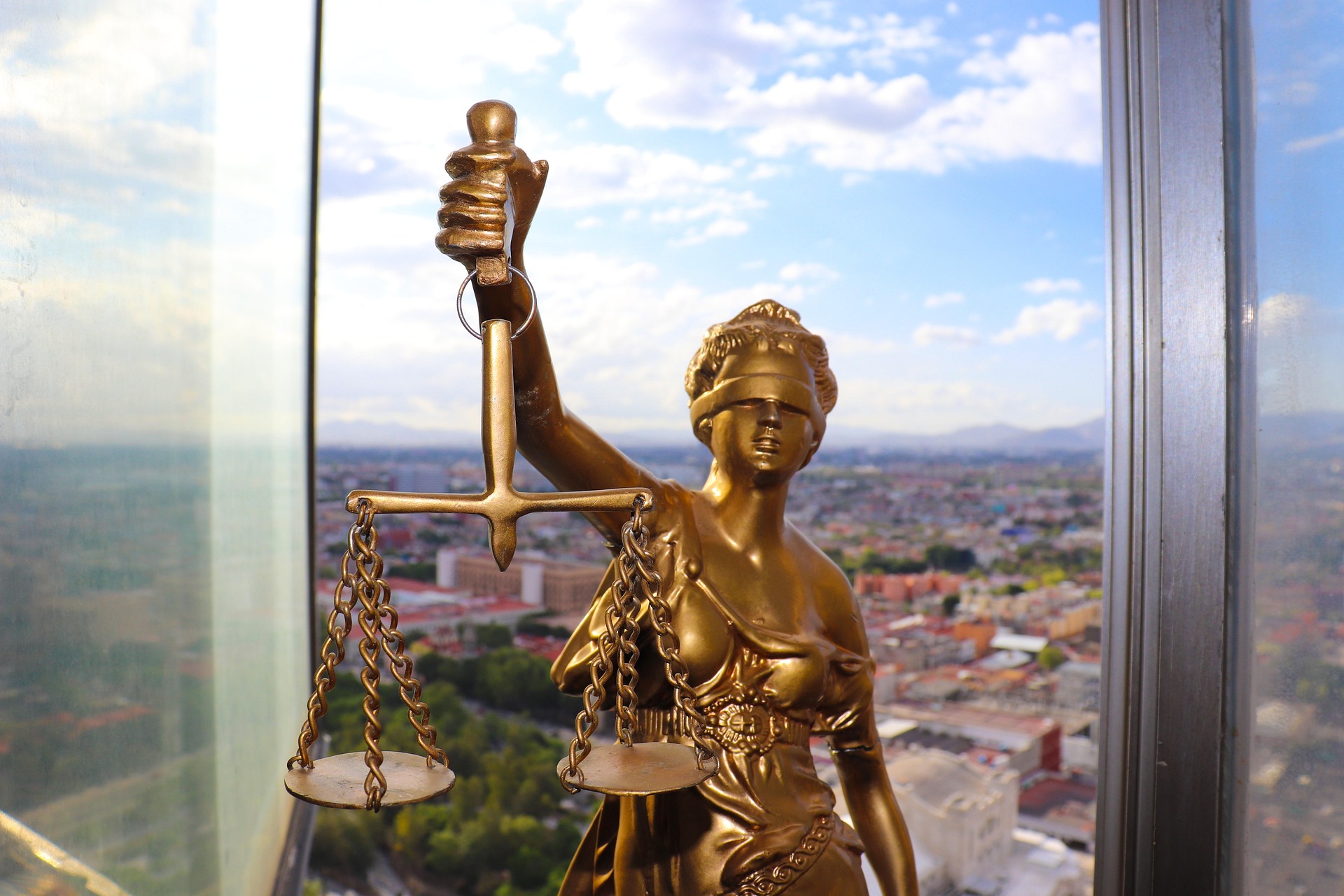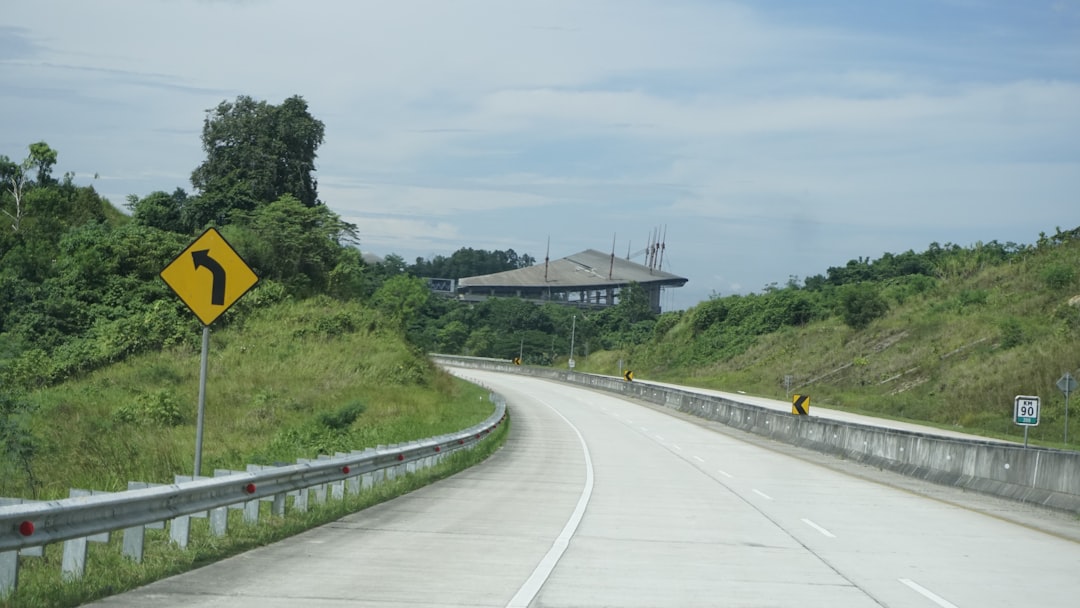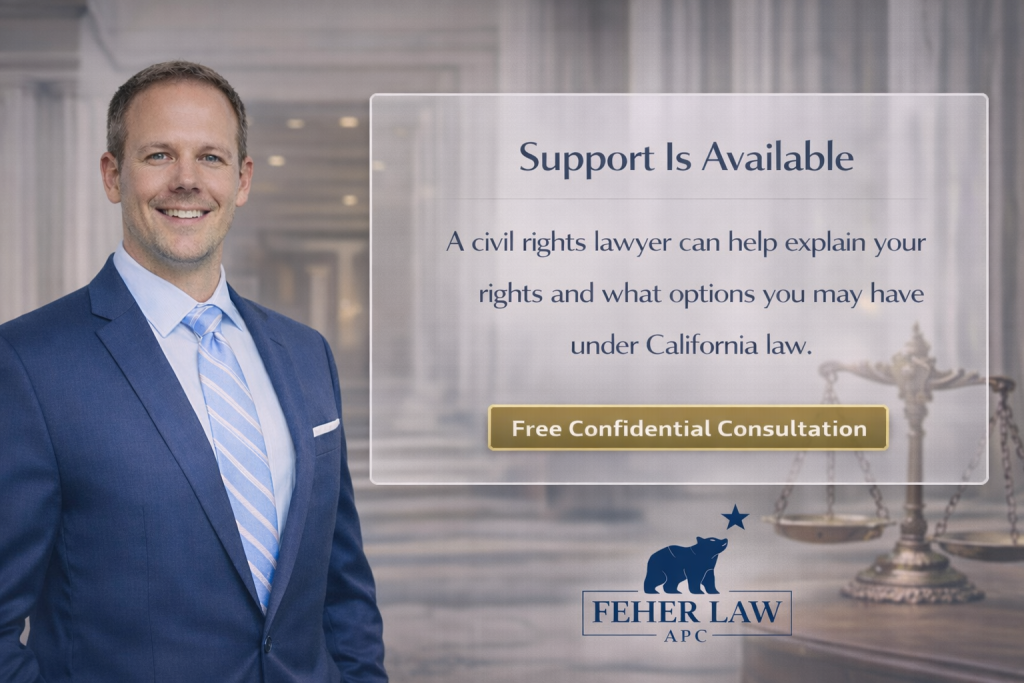California Civil Rights Lawsuit Settlement Amounts

Civil rights lawsuit settlements often fall within the average civil rights range of $50,000 to $300,000, though serious misconduct, systemic violations, or class actions can result in multi-million-dollar recoveries.
In our experience at Feher Law, outcomes depend on key factors that influence settlement amounts, including:
- The severity of the violation
- Employer size
- Lost wages
- Emotional distress
- Whether damages are limited under state or federal law
The strength of the evidence, intentional misconduct, and protections under statutes like California’s FEHA also significantly affect final compensation.
If you are questioning whether your case aligns with the average civil rights settlement range or may qualify for higher damages, experienced legal guidance is essential. Our attorneys will evaluate the factors that influence settlement amounts, outline your legal options, and pursue maximum compensation on your behalf.
Call (866) 646-6676 today for a free consultation with a California employment lawyer at Feher Law and take the next step toward protecting your rights.
Civil lawsuit settlement amounts: How much is a civil rights lawsuit worth?
📌 Civil rights settlements vary significantly based on the type of violation, the harm suffered, and the strength of your evidence. Understanding typical settlement ranges can help you set realistic expectations for your case.
- Minor violations: $50,000 – $100,000
- Moderate violations: $100,000 – $150,000
- Serious misconduct: $150,000 – $200,000
- Severe misconduct (e.g., police brutality, wrongful imprisonment): $200,000 – $300,000
- Extreme cases involving death or life-altering injuries: $300,000+
| Violation Severity | Example | Settlement Range |
|---|---|---|
| Minor Violation | Denial of services based on race | $50,000 – $100,000 |
| Moderate Violation | Employment discrimination | $100,000 – $150,000 |
| Serious Misconduct | Sexual harassment in workplace | $150,000 – $200,000 |
| Severe Misconduct | Police brutality with injuries | $200,000 – $300,000 |
| Extreme Cases | Wrongful death from excessive force | $300,000+ |
📌Some civil rights cases involving systemic violations — where multiple people are harmed by the same illegal practices — can lead to class actions or extraordinary verdicts.
For example, in 2021, a federal jury awarded $137 million to Owen Diaz in a racial harassment case against Tesla’s Fremont factory (New York Times, 2021). Although the award was later reduced, the case shows how severe and widespread misconduct can lead to substantial payouts far beyond typical individual settlements.

Compensation for civil rights violations: what you may be entitled to
When your civil rights are violated, you deserve comprehensive compensation that acknowledges both the tangible and intangible harms you’ve suffered.
Economic damages
Economic damages cover concrete financial losses resulting from the civil rights violation:
- Medical expenses for physical or psychological treatment
- Lost wages and diminished earning capacity
- Property damage
- Legal fees and costs
Non-economic damages
Non-economic damages address the emotional and psychological impact:
- Pain and suffering from the violation
- Emotional distress and mental anguish
- Loss of enjoyment of life
- Damage to reputation
Punitive damages
In cases of particularly egregious misconduct, courts may award punitive damages:
- Designed to punish the wrongdoer
- Intended to deter similar future violations
- Often awarded in cases involving malicious intent or gross negligence
⚖️ Compensation isn’t just about recovering money—it’s about holding wrongdoers accountable for violating your basic rights.
According to the California Civil Rights Department, victims can file complaints for various violations, which may lead to settlements or court-ordered remedies.
Our Huntington Beach employment lawyer team is ready to evaluate your case and help you seek the maximum compensation available under law.
Factors That Impact Civil Rights Settlements
Several interconnected factors influence how much a civil rights settlement may be worth, with courts and defendants closely evaluating both the severity of the violation and the strength of the legal claim.
- Severity of harm and intent: More egregious conduct—such as malicious actions, reckless indifference, or gross misconduct—often leads to higher settlements, especially when victims suffer serious physical injuries, psychological trauma, or long-term financial losses.
- Strength and clarity of evidence: Clear proof, including video footage, credible witness testimony, documentation, or patterns of similar violations, significantly increases settlement value and leverage during negotiations.
- Whether the violation was isolated or systemic: Evidence showing a broader policy or repeated misconduct can elevate cases into higher settlement ranges and may even support class actions.
- Type of damages sought: Lost wages and economic losses are typically uncapped, while emotional distress and punitive damages vary based on the facts, intent, and applicable laws.
- Employer size and damage caps: Under federal law, smaller employers may face capped damages (often up to $300,000), while larger employers and certain state-law claims may allow substantially higher recoveries.
- Jurisdiction and applicable laws: State statutes—such as California’s FEHA—often provide broader protections and allow for greater compensation than federal law alone.
- Early settlement versus trial: Cases that proceed to trial can result in higher awards but involve greater risk, longer timelines, and uncertainty.
- Victim’s background and circumstances: Employment history, pre-existing conditions, and the personal impact of the violation can influence compensation calculations.
- Quality of legal representation: Experienced civil rights attorneys are often better positioned to identify all available damages, overcome defense strategies, and secure more favorable outcomes.
Together, these factors shape both the settlement range and the likelihood of achieving full and fair compensation for a civil rights violation.
| Factor | Potential Impact |
|---|---|
| Strong video evidence | Significantly higher settlement |
| Multiple victims/systemic issue | Potential class action and higher awards |
| Early settlement vs. trial | Trial verdicts often higher but riskier |
| State/federal jurisdiction | Federal cases may yield larger settlements |
| Media attention | Can pressure defendants to settle favorably |
Civil violation examples: Common reasons why people sue
Civil rights lawsuits arise when individuals experience serious violations of their constitutionally protected freedoms. These claims seek to hold wrongdoers accountable and secure justice for the harm suffered.
Here are some of the most common reasons people file civil rights lawsuits:
- Police Misconduct: Excessive force, unlawful arrests, false imprisonment, or shooting incidents that violate constitutional protections.
- Employment Discrimination: Unfair treatment based on protected characteristics like race, gender, age, or disability status.
- Housing Discrimination: Refusal to rent or sell property based on protected characteristics.
- Voting Rights Violations: Interference with voter registration or access to polling locations.
- Wrongful Conviction: Imprisonment for crimes not committed, often involving misconduct by prosecutors or police.
- Unlawful Search and Seizure: Violations of Fourth Amendment protections against unreasonable searches.
- Discrimination in Public Accommodations: Denial of services in businesses, government offices, or educational institutions.
- First Amendment Violations: Restrictions on free speech, peaceful assembly, or religious expression.
📌Civil rights issues can impact nearly every part of life — from voting booths and housing offices to police interactions and workplace environments. If your rights have been violated, you may have strong grounds to pursue legal action and seek fair compensation.
Due process lawsuit settlements: protecting your constitutional rights
Due process violations occur when government officials deprive individuals of fair treatment in legal proceedings. These violations can form the basis for substantial civil rights settlements.
When law enforcement or government agencies fail to follow proper procedures, they violate the fundamental constitutional guarantees found in the Fifth and Fourteenth Amendments.
📌Common examples of due process violations include:
- Wrongful arrest without evidence: Damages reputations and causes lasting emotional trauma.
- Prolonged detention without charges: Often leads to job loss, family separation, and severe emotional distress.
- Denial of fair trial rights: Includes being denied access to an attorney, exclusion of exculpatory evidence, or facing biased proceedings.
- Wrongful convictions: Life-altering outcomes that devastate families and futures.
In California, these violations are taken particularly seriously due to the state’s strong constitutional protections.
✔️According to the U.S. District Court for the Central District of California, due process violations often result in settlements ranging from $100,000 to several million dollars, depending on the duration and severity of the constitutional deprivation.

Steps to build your civil rights lawsuit
- Document the violation: Immediately collect photos, videos, and written accounts of what occurred. Clear, contemporaneous records often carry more weight than recollections made later and can directly support key aspects of your case.
- Preserve evidence and records: Keep a detailed timeline, medical records, employment files, and all related communications. Organized documentation forms the foundation of your claim and can help result in higher settlements.
- Report the violation: File formal complaints with agencies such as the California Civil Rights Department, the U.S. Department of Justice, or appropriate oversight boards. Properly prepared reports create an official record that strengthens critical aspects of your case.
- Consult an experienced civil rights attorney: Early legal guidance helps protect your rights, avoid costly mistakes, and assess the strengths and weaknesses of your claim. An attorney can identify the most important aspects of your case and develop a strategy aimed at maximum recovery.
- Prepare emotionally for negotiations or trial: Civil rights cases can be lengthy and stressful. Having realistic expectations and support systems in place helps you stay resilient throughout the process.
Our Torrance employment lawyer can help you navigate the complexities of civil rights litigation while working to protect your privacy to the greatest extent possible.
Hypothetical scenario: What a civil rights case might look like
💡Hypothetical scenario: A man is wrongfully detained by police officers during a peaceful protest in San Francisco County. Despite clearly identifying himself as a journalist, he is arrested without probable cause and held for 36 hours without charges.
During his detention, he sustains minor injuries and is denied his request to contact an attorney, violating his First and Fourth Amendment rights.
After his release, the journalist documents his injuries and files a complaint with the department’s internal affairs office. He then seeks legal counsel from a civil rights attorney to pursue legal action.
The case includes strong evidence, such as body camera footage contradicting the officers’ stated reasons for the arrest and multiple witness statements supporting his account.
✔️ The city, concerned about negative publicity and the strength of the evidence, offers a $175,000 settlement to avoid a trial.
✔️ The settlement covers physical injuries, emotional distress, lost wages from missed work, and attorney fees, providing financial compensation and acknowledgment of the harm suffered.
How Feher Law can help protect your civil rights
At Feher Law, we help individuals facing civil rights violations pursue justice and meaningful compensation, whether the issue involves a single discrimination case or widespread misconduct. Every case is unique, and outcomes often depend on the severity of the violation, the quality of evidence, and whether the conduct was isolated or systemic. Our team focuses on building strong, well-documented claims that position clients for the highest possible recovery under California law.
When you work with our California employment attorney, we will:
- Investigate the violation and preserve critical evidence
- Identify all available damages and responsible parties
- Develop a tailored legal strategy and negotiate aggressively
- Take your case to trial if a fair settlement is not offered
If you believe your civil rights have been violated, don’t wait to protect your claim. Call (866) 646-6676 today to speak with a California employment attorney at Feher Law and schedule your free consultation.

FAQs
How long does a civil rights lawsuit take to settle in California?
A civil rights lawsuit in California—including a discrimination lawsuit—typically takes between 12 to 36 months to resolve, depending on case complexity, evidence availability, and whether the matter settles or proceeds to trial. Straightforward discrimination cases with clear liability may settle within months, while more complex claims involving government entities or systemic discrimination often take several years to conclude.
Can I still file a civil rights lawsuit if the violation happened years ago?
You may still be able to file a civil rights lawsuit even if the violation occurred years ago, but you must be aware of strict time limitations. In California, most civil rights claims must be filed within 1-3 years of the violation, depending on the specific right violated and whether the defendant is a government entity or private party.
Federal claims typically have different deadlines, often requiring administrative complaints to be filed within 180-300 days.
What types of evidence are most helpful in a civil rights case?
The most compelling evidence in civil rights cases includes video/audio recordings of the incident, written documentation created at the time of the violation, medical records connecting injuries to the event, communications acknowledging wrongdoing, testimony from neutral witnesses, pattern evidence showing similar violations by the same defendant, and expert opinions establishing damages or standard violations.
Will filing a civil rights lawsuit make my case public?
Filing a civil rights lawsuit generally makes basic case information public, including your name, the nature of your claims, and the relief sought. Court filings become public records accessible through courthouse databases, and high-profile cases may attract media attention.
However, certain sensitive information can be filed under seal in appropriate circumstances, and confidential settlements may include non-disclosure provisions to maintain privacy regarding specific details.
Related Posts

Driver Flees After East Hollywood Crash

Olympic Crash Nearly Costs Lindsey Vonn Her Leg

If Someone Brake Checks You, Who’s at Fault in California?

One Injured in LA Car Collision on SR 60

How Long Does a Retaliation Lawsuit Take?





